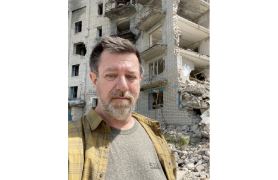This is a report we missed 8 weeks or so back but worth highlighting
After Russia invaded Ukraine in February 2022, John Hall, JD ’00, followed the war from his vantage point as a professor at Chapman University Fowler School of Law in Orange, CA. Hall, a human rights and international law scholar, felt helpless and horrified. Finally, as the 2022-23 school year started to wind down, he decided he needed to go to Ukraine to see what he could do to help. He spent the summer of 2023 volunteering with the highly regarded Kharkiv Human Rights Protection Group.
Hall, a native of England who also specializes in art law, spent two weeks in the capital, Kiev, and seven weeks in Kharkiv in northeast Ukraine, 18 miles from the Russian border. He supported Ukrainian lawyers as they worked seven days a week to build cases for what they hope will be eventual war crimes actions against Russia in the International Criminal Court, as well as other courts and tribunals.
He also experienced frequent missile attacks and bore witness to the daily destruction unleashed across Ukraine.
Hall spent much of his time gathering evidence of a Russian objective that he says often gets lost in the news coverage of so much human tragedy. “Putin’s goal is to erase Ukrainian culture, heritage and history,” Hall says. “Russia is attempting to do that by systematically targeting, destroying, and looting museums, libraries, galleries, theaters, historical buildings, archives, and monuments. I came to understand that this destruction of Ukrainian culture is central to Putin’s war. He’s trying to destroy any idea of a separate and independent Ukrainian culture.”
Here, Hall discusses his work in Ukraine, which merged his human rights and art law expertise, including the monumental efforts of the Ukrainian lawyers with whom he worked and the shocking stories he heard.
You focused your research and evidence-gathering on Russia’s destruction of Ukraine’s cultural heritage. What did you learn?
Kharkiv, an industrial and university city where I spent most of my time, was a place of learning, culture, and history, with a vibrant music and arts scene. After months of Russian bombardment, many of the key cultural sites are now in ruins. University buildings have been struck by guided missiles and are empty shells. Music venues, theaters, museums, and art galleries have been struck. The ruined cultural sites across Ukraine speak to a Russian goal rarely discussed in the media: this is a war intended to erase Ukrainian culture, heritage and history. Putin and Russian pundits have been questioning the very existence of an independent Ukraine, calling the Ukrainian leadership and its supporters “fascists” and “neo-Nazis” as justification for their illegal invasion. Erasing Ukraine’s cultural centers goes to the heart of Putin’s vision of Ukraine as not having its own culture and heritage, which is, of course, entirely false.
What are some examples of this deliberate destruction of Ukrainian culture?
Unfortunately, there are many. In March 2022, the Donetsk Academic Regional Drama Theater in Mariupol was destroyed by a bomb dropped by a Russian aircraft. At least 600 civilians were killed who had been taking shelter there. The building was clearly marked “children.” In February 2022, a museum in Ivankiv dedicated to the beloved folk artist Maria Prymachenko was partially burned down and destroyed, resulting in a loss of 23 paintings by the artist. In April 2023, a Russian missile erased a history museum in Kupiansk.
One of the most obvious ideological attacks on Ukrainian identity occurred in May 2022, when Russian missiles targeted the historic home of Ukraine’s most famous poet and philosopher Hryhoriy Skovoroda, located in the isolated and otherwise insignificant village of Skovorodynivka. Skovoroda has been of enormous influence to generations of Ukrainians since the 18th century, and is seen as a symbol of Ukrainian heritage. Russia, however, claims Skovoroda as its own, and the destruction of his home was a way of erasing links to Ukraine.
What kind of evidence-gathering and day-to-day work did you engage in?
My work primarily involved analyzing, verifying, and collecting disparate eyewitness and media reports and photographs of the destruction of historical buildings, libraries, galleries and so forth. I then assessed suitable legal theories, if any, that this evidence would support, whether claims under the 1954 Hague Convention, the 1970 UNESCO Convention, the Genocide Convention, or customary international law.
I plan on completing a law review article about the legal issues relating to the destruction of cultural heritage in Ukraine. I am hoping to return to Ukraine next summer to continue my work there, but that depends on locating some financial support.
What was it like to work with the Ukrainian lawyers?
It was an honor for me to be working alongside them and the little I could contribute paled in comparison to what they were doing. I was always very conscious of my role there as a foreigner, but I could use my role as an experienced human rights attorney to offer a degree of psychological support if nothing else. These were very young attorneys. The majority were in their twenties. They risked their lives routinely to go to places where bad things have happened. Every day, they engage in interview after interview after interview, where people come in and break down and tell them the worst possible things. They’ve been doing that for well over a year now, seven days a week. They were lovely, amazing, dedicated people, and clearly exhausted. They have put aside their own traumas and their own psychological well-being in order to serve their clients 24/7. It was so moving to see.
Read full interview at
John Hall, JD ’00, Reports on His Nine Weeks in Ukraine Gathering War Crimes Evidence




